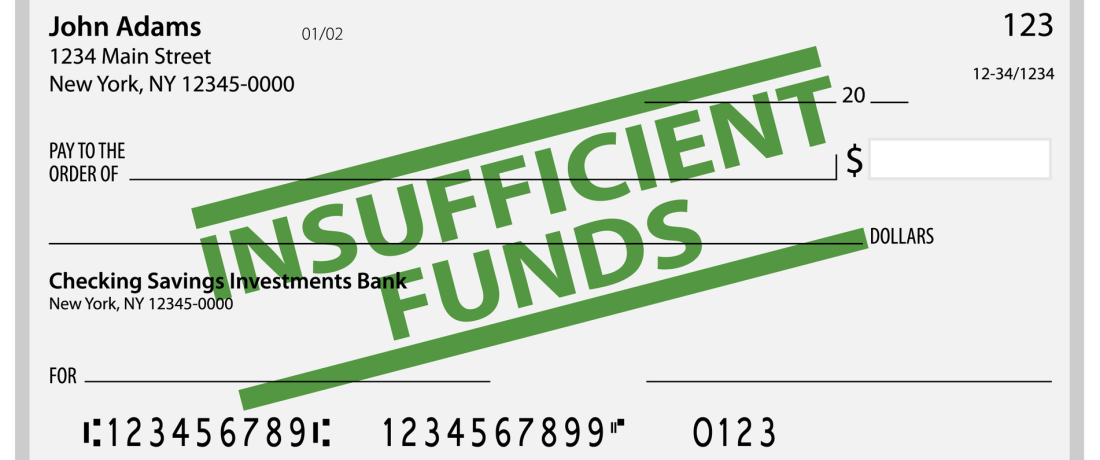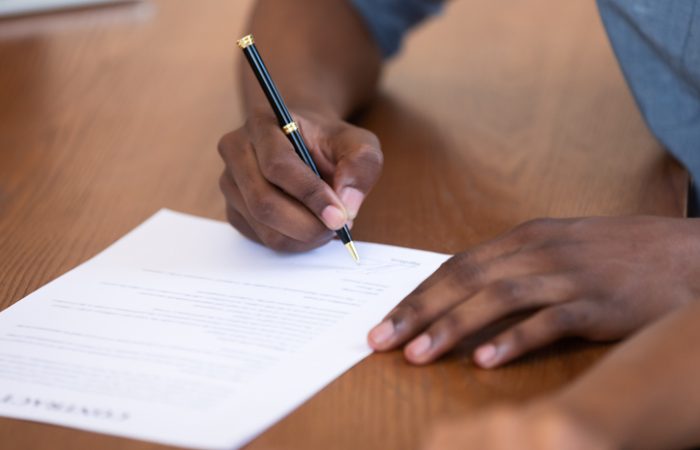By Andrew J. Salinas
Imagine this: you’re a contractor in Virginia who just accepted a major home improvement project. You spend days collecting the necessary materials and doing backbreaking work so you can do the best job you can. You drive away with the final check and take it to the bank. You walk in, expecting to get paid for the last few long days of your labor you’re shocked when the teller tells you the check bounced. Now you have to explain to your workers that they won’t get paid.
Or, you’re a young person in Virginia working odd jobs off Craigslist. You just cleaned out a person’s apartment, walked their dog, or mowed their lawn. They thank you for the work and hand you a check. You deposit it through your banking app and go about your day. A few days later you’re surprised when the bank notifies you that the check was bad and now you’re short on the cash you needed for rent this month.
Maybe you co-own a property with someone and your co-owner gave you a bad check for their part of the mortgage, which put your loan in jeopardy of default? (Note: if you need to re-finance your mortgage due a bad check or covid or some other reason, check out this article that may be helpful.)
What can you do to recover the money from the bounced check?
In addition to getting the exact amount recorded on the bad check, Virginia law also entitles you to:
- The legal interest from the date of the check;
- The protest or bad check return fee, if any, charged by the financial institution;
- A processing charge of $50.00; and
- Reasonable attorney’s fees if awarded by the court.[1]
What if I’m in a situation where I was depending on this person to write me more checks? Say I’m a contractor who made an agreement with a client to renovate their house and we’ve already agreed they would pay me in three installment checks. I’ve already purchased all the building materials and put in a substantial amount of labor when the second check they gave me was bad. Even if I get the full amount of the second check, I’m still one full check short. I also passed on another project to do the home renovation and now have lost that opportunity. Do I have any other legal remedies?
Possibly. Did you already perform or substantially perform your end of the deal? In that case there are several options under the common law of Virginia. For example, there exists the private right of action known as breach of contract. Circling back to the hypothetical contractor situation, in a breach of contract claim a court could award you restitution, thus entitling you to the money you already spent on materials and labor. A plaintiff asserting a claim for breach of contract must prove the following elements:
- There exists a legally enforceable obligation of a defendant to a plaintiff;
- The defendant’s violation or breach of that obligation; and
- Injury or damage to the plaintiff caused by the breach of obligation.[2]
Even if you didn’t have some sort of contract with the bad check issuer, the common law also provides you with a fraud claim where plaintiff needs to prove by clear and convincing evidence that:
- The seller intentionally and knowingly;
- Made a false representation;
- Of a material fact;
- That was relied upon by the plaintiff buyer; and that
- Resulted in damaged to the party misled.[3]
Under these common law claims you could be entitled to receive restitution for any labor you provided the issuer and even potentially punitive damages that punish the issuer for their deceptive conduct.
Finally, Virginia criminalizes writing bad checks as a form of larceny. The elements of this crime are outlined as follows:
- Any person within the Commonwealth of Virginia who;
- With intent to defraud;[4]
- Makes, draws, utters, or delivers;
- Any check, draft, order, or other instrument for the payment of money upon any bank, banking institution, trust company, or other depository; and
- Knowing at the time of creating the aforementioned instruments that the maker or drawer does not have sufficient funds in or credit with such bank, banking institution, trust company, or other depository;
a. Is guilty of the Class 6 felony of larceny if the check is worth $1,000.00 or more and could receive one to five years in prison or up to one year in jail and/or a fine up to $2,500.00, or
b. Is guilty of a Class 1 misdemeanor of larceny if the check is worth less than $1,000.00 and could serve a jail sentence up to a year and/or pay a fine of $2,500.00.[5]
You do not need to show that you received anything in return for the check for this law to apply.[6] You may report the bad check issuer to your local Commonwealth’s Attorney’s Office for prosecution. You can do this even if they eventually pay you back.[7]
If you received a bad check and want to get what you’re owed, contact Steven Krieger, PLLC for a consultation.
***
[1] § 8.01-27.1(A).
[2] Sunrise Continuing Care, LLC v. Wright, 277 Va. 148, 671 S.E.2d 132, 135 (Va. 2009) (quoting Filak v. George, 267 Va. 612, 594 S.E.2d 610, 614 (Va. 2004)).
[3] State Farm Mut. Auto. Ins. Co. v. Remley, 270 Va. 209, 218, 618 S.E.2d 316 (2005)(quoting Prospect Development Co. v. Bershader, 258 Va. 75, 85, 515 S.E.2d 291 (1999)).
[4] The fact that the issuer issued the check in the first place creates a prima facie presumption that issuer knew the account had insufficient funds. Bolinsky v. Commonwealth, No. 2055-93-2 (Ct. of Appeals Feb. 14, 1995).
[5] Va. Code §§ 18.2-181; 18.2-10; 18.2-11.
[6] Payne v. Commonwealth, 222 Va. 485, 281 S.E.2d 873 (1981).
[7] Cook v. Commonwealth, 178 Va. 251, 16 S.E.2d 635 (1941).




